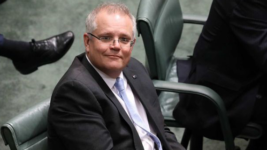Religious Freedom vs Equal Treatment: A Narrow and Divisive Debate

Just as the Christmas break was about to kick in, Australian treasurer Scott Morrison told Fairfax Media that he’ll been fighting back against discrimination against Christians – as well as other religions – next year.
As an example of the suffering Christians have faced, the treasurer pointed to a Facebook post by Senator Nick McKim that showed the Australian Greens politician hanging a sign that read, “Merry Non-Denominational Seasonal Festivity.”
The Greens, along with many others, would no doubt see the post as a tongue-in-cheek way of including people from all communities within Australia’s multicultural society in a national holiday, rather than a slight against its major religion.
Morrison vowed to play a leading role in the push to enact laws protecting religious freedoms in 2018. The direction he would take the debate will be informed by the findings of the inquiry into the issue, which is being headed by former attorney-general Philip Ruddock.
Backlash against equality
The treasurer was one of the leading conservative Coalition parliamentarians pushing for religious protection amendments to the marriage equality bill, before it passed through parliament unamended on December 7.
The Ruddock inquiry into religious freedoms was set up by prime minister Malcolm Turnbull in response to the concerns of his colleagues and ‘No’ voters over same-sex marriage laws. The PM said that any reasonable inquiry recommendations will be considered.
The five member panel includes Australian Human Rights Commission president Rosalind Croucher, Catholic priest and lawyer Frank Brennan, who it might be noted was a ‘Yes’ voter, as well as former federal court judge and current Bond University chancellor Annabelle Bennett.
A late addition to the panel was University of Queensland constitutional law professor Nicholas Aroney, who has argued that the freedom to practice a restricted form of sharia law, within the limits of the general law, is warranted.
Mr Aroney feels that religious freedom has become subordinate to the right against discrimination. Just Equal spokesperson Rodney Croome has expressed concerns about Aroney’s appointment, as the latter “believes religious freedom trumps other rights, including equality.”
Rights are threatened, but not religious
A key argument of religious freedoms protection campaigners is that Australian laws protect the right against discrimination, and yet provide little protections for religions.
However, the 2015 Australian Law Reform Commission (ALRC) Traditional Rights and Freedoms report found there was no cause for concern about infringements upon religious freedoms under federal laws.
“There is no obvious evidence that Commonwealth anti-discrimination laws significantly encroach on freedom of religion in Australia, especially given the existing exemptions for religious organisations,” the report noted.
That said, the report did recommend that religious freedoms be considered under future inquiries, when looking at the “harmonisation” of Commonwealth, state and territory anti-discrimination laws.
The report resurfaced this week after the Institute of Public Affairs, along with the ALRC, criticised the Turnbull government for failing to act upon its findings regarding the continuing erosion of other fundamental rights by the enactment of federal laws.
Ruddock inquiry panel member Rosalind Croucher was president of the ALRC at the time the report’s findings were tabled.
And considering the ALRC inquiry found no threats to religious freedoms at the Commonwealth level in December 2015, the question remains whether the current inquiry might find any laws that have been enacted since then that might have encroached on the right to religion.
The threat of state laws
In November 2016, the Human Rights Sub-Committee inquiry into the status of the human right to freedom of religion or belief was established. Its interim report, released last month, found that “legal protection of religious freedom in Australia is limited.”
The report further found that threats to religious freedoms aren’t due to the dominance of one religion over all others. Rather, the problem is posed by state anti-discrimination laws, “which do not allow for lawful differentiation of treatment by religious individuals and organisations”.
“While religious exemptions within non-discrimination laws provide some protection,” the report reads, they don’t “acknowledge the fundamental position that freedom of religion has in international human rights law.”
Kevin Andrews, chair of the Human Rights Subcommittee, points out that article 18 of the International Covenant on Civil and Political Rights (ICCPR) states that “everyone shall have the right to freedom of thought, conscience and religion,” has not been enshrined in Australian law.
Whereas, the right against discrimination, contained in article 26 of the ICCPR, has been.
The changing social fabric
However, the whole point to the marriage equality debate was whether certain members of the community could have the same rights as others – the right of LGBTIQ people to legally solemnise their partnerships – which religious attitudes had forbidden in the first place.
It might be noted that Philip Ruddock was attorney general in 2004, when the Howard government amended the Marriage Act to define marriage as the “voluntarily entered into union of a man and a woman to exclusion of all others.” And it was this act that ensured LGBTIQ people couldn’t get married.
It seems that as same-sex marriage was slowly becoming a reality, several inquiries were established to ascertain whether religious freedoms are protected under the law, as for the first time parts of the belief systems of certain major religions were being legally confronted with different values.
In the past, it has been justified and indeed necessary in the interests of equality to legislate to prohibit discrimination against diversity, because minorities were suffering inequalities under the law in a society that was dominated by particular institutions.
Enshrining all rights under the law
But, it might be time for certain parties to take a step back from the table and have a look at a different approach to dealing with fundamental rights under the law.
As Stephen Blanks, president of the NSW Council for Civil Liberties told Sydney Criminal Lawyers® last week, basic human rights “do compete against each other on occasions.”
And rather than “singling out one right out of context of all the other rights,” the current debate might be an opportunity to talk about why all “human rights ought to be better protected in our legal system”.
So instead of enacting religious exemptions laws so that certain members of society can treat others differently on the basis of their beliefs, which would be inconsistent with international human rights standards, we might look at the issue of rights in a broader way.
Indeed, it might be time to legislate for an Australian bill of rights that would enshrine all basic human rights equally under the law, ensuring that the basic freedoms and protections of all Australians are safeguarded, not just those of the majority.








